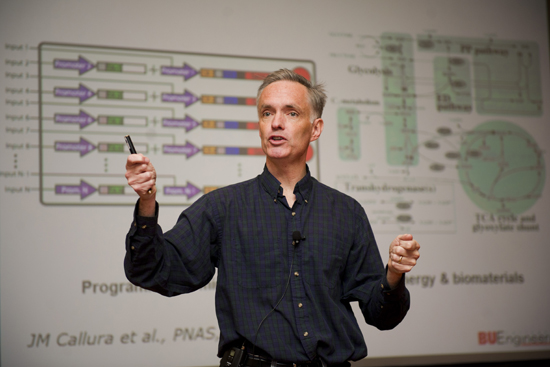Jim Collins Elected to American Academy of Arts and Sciences
Honor followed by grant from Bill and Melinda Gates Foundation

Jim Collins, who has been elected a member of the American Academy of Arts and Sciences, says his family is very excited about the possibility of meeting Sir Paul McCartney at the October induction ceremony. Photo by Cydney Scott
Jim Collins thought at first that the FedEx envelope from the American Academy of Arts and Sciences was another request for a grant review. It wasn’t.
“When I opened the envelope, I read the letter saying that I was elected to the American Academy of Arts and Sciences,” Collins says. “I was thrilled.”
Collins, a William Fairfield Warren Distinguished Professor and College of Engineering professor of biomedical engineering, was recognized by the academy for his contributions to engineering sciences and technologies, one of eight inductees in the field.
The academy, founded in 1780 by John Adams, John Hancock, and others, is one of America’s most respected honor societies. It recognizes extraordinary work in the areas of academia, public affairs, the arts, business, and the humanities.
“It’s an honor that was unexpected; it means a lot to me because membership is based on selection by peers,” Collins says. “I have many outstanding colleagues who are members of the academy, so to be joining them is a huge honor for me.”
Collins was also awarded a Grand Challenges Explorations grant last week from the Bill and Melinda Gates Foundation to pursue a new approach to cholera prevention. He and two postdoctoral fellows in his lab, Ewen Cameron and Peter Belenky, hope to use synthetic biology to engineer a probiotic yogurt bacterium to detect and kill the cholera bacterium in the human intestine. Initial Grand Challenges Explorations grants of $100,000 are awarded twice a year, and successful projects are eligible for a follow-on grant of up to $1 million.
Collins, a codirector of the Center for BioDynamics, is a pioneer in complexity science. His lab works to create synthetic gene networks, whose many uses include fighting bacterial infections. His research has inspired new devices to treat stroke-induced brain failure and has enhanced doctors’ understanding of how human posture is warped by aging and Parkinson’s disease. He is known among his engineering students for his humor and clarity—in 2000 he won the University’s highest teaching honor, the Metcalf Cup and Prize for Excellence in Teaching.
A Rhodes scholar, Collins won a MacArthur “genius” award in 2003. Two years later, Scientific American named him one of the 50 top leaders in science and technology. In 2008 he became BU’s first Howard Hughes Medical Institute investigator, a position he holds concurrently with his BU appointment. In 2010, Collins received the Lagrange-CRT Foundation Prize, given by the Institute for Scientific Interchange Foundation in Turin, Italy. In 2011, he was elected to the National Academy of Engineers. He earned a BA from the College of the Holy Cross and a PhD from Oxford University.
As a member of the American Academy of Arts and Sciences, he will be invited to contribute to its publications and studies of science and technology policy, energy and global security, social policy and American institutions, the humanities and culture, and education.
In a ceremony in October, Collins will be inducted with 220 other members, including U.S. Secretary of State Hillary Rodham Clinton, actor and director Mel Brooks, philanthropist Melinda Gates, actor and director Clint Eastwood, Walt Disney Company CEO and chairman Robert Iger, former Beatle Paul McCartney, and Boston Globe editor Marty Baron.
While he’s looking forward to the induction ceremony, held at the academy’s Cambridge, Mass., headquarters, Collins says, his family is wildly excited.
“This is an honor that my family can relate to—they’re overjoyed,” he says, adding that they are very excited about the possibility of meeting Sir Paul McCartney. “They insisted they attend and we’ll have some fun.”
Comments & Discussion
Boston University moderates comments to facilitate an informed, substantive, civil conversation. Abusive, profane, self-promotional, misleading, incoherent or off-topic comments will be rejected. Moderators are staffed during regular business hours (EST) and can only accept comments written in English. Statistics or facts must include a citation or a link to the citation.